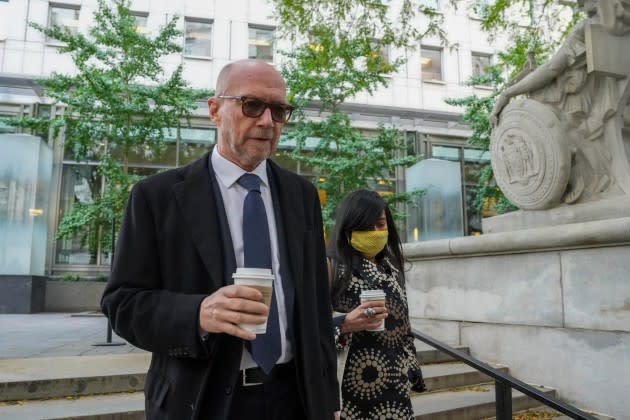
UPDATED, 4:15 PM: Paul Haggis coaxed Haleigh Breest into his apartment in New York after a party in 2013 with the intent of having sex with her whether she consented to it or not, and then he raped her even as she repeatedly said no, a lawyer for Breest told jurors Wednesday.
As the lawyer, Ilann Maazel, delivered the final closing arguments in the New York sexual assault civil trial, a text that Breest wrote to a friend the next day floated on a video monitor in front of the jury: “And I keep saying no.”
More from Deadline
“Those are the five most important words in this case,” Maazel said.
After 15 days of evidence and arguments from both sides — read about the closing argument from Haggis’ lawyer below — the jury will start deliberating Thursday morning whether the Oscar-winning filmmaker committed rape and what damages if any to award to his accuser. Maazel urged the jury of three men and three women, with two alternates, to hold Haggis “accountable for the choices he made and the damage he caused” to a woman who is still traumatized by what happened.
“This is a horror film by Paul Haggis, and only you can end it,” he said.
Breest sued Haggis in 2017 alleging that he forced her to have intercourse and perform oral sex on him, and pushed his fingers inside of her before she passed out in a guest bedroom. The two had attended a movie-screening party on Jan. 31, 2013 where Breest was working as a publicist and Haggis was a VIP guest. Haggis has said the sex was consensual and, as best as he can remember, went no farther than oral sex initiated by Breest.
“That was Haley Breest, 26 years old,” Maazel said, posting a photograph on the screen of a smiling Breest at an earlier event.
“That woman doesn’t exist anymore,” he said as Breest looked on from her seat. “Paul Haggis took that away.”
A lawyer for Haggis, Priya Chaudhry, went first with a depiction of Breest as a troubled and emotionally immature young woman who had sex with an older, famous man and mistakenly thought it was the beginning of something more, and recast it as a rape in revenge for being rejected.
Chaudhry replayed texts between Breest and a friend trading jokes and “lols” about sex with Haggis and Breest saying she’d like “get even” and be “in control” of their next sexual encounter, which never happened.
“These are not the text messages following a violent rape,” Chaudhry said.
Breest told staff at a Planned Parenthood clinic during a regular gynecological exam in March of 2013 that she had been raped. She did not tell the police. Most women don’t, Maazel said, echoing a clinical psychologist who testified for Breest. Maazel said the texts were Breest “trying to normalize something that isn’t normal.”
“You are seeing a sexual assault survivor process her rape in real time,” he told jurors.
The friend in the trial’s most closely parsed text exchanges, Lyudmila Bouzinova, wrote back that what Breest was describing was “borderline rape.” Maazel said the defense ignored texts to Bouzinova that said what Haggis did was “wrong” and “I keep saying no.”
Maazel played back depositions and trial testimony from four other women who said Haggis forced himself on them in separate incidents between 1996 and 2015 after using different ruses to get them alone.
“We have to face the cold hard fact that Paul Haggis is a monster,” Maazel said. “He is a psychopath. He is cunning, deceitful and manipulative.”
“He has the gall to sexually assault five women and then get on the stand and play the victim,” he said.
Maazel scoffed at the defense for arguing that the Church of Scientology, which Haggis quit publicly in 2009, had any role in the case or the underlying accusations. “The Scientology defense is the last cynical grasp of a desperate man,” he said. “How stupid does he think we are?”
PREVIOUSLY, 12:58: PM: Paul Haggis had an “awkward one-night stand” in 2013 with an infatuated young woman, Haleigh Breest, who wanted more intimacy from the Oscar-winning filmmaker and, when there was none, made up a rape allegation for a #MeToo-adjacent 2017 lawsuit that has “utterly destroyed him,” a lawyer for Haggis told jurors Wednesday in the three-hour first closing argument of the New York sexual assault civil trial.
“There are three ‘R’ words that happened here: rejection, regret and revenge,” said the lawyer, Priya Chaudhry. “And none of these ‘R’ words are rape.”
Related Story
Leah Remini Testifies That “Paul Haggis Is The Victim” In Sexual Assault Civil Trial; Defense Rests
Related Story
Danny Masterson Rape Trial Will Not See Lisa Marie Presley Testify After All
Related Story
Danny Masterson Rape Trial: Non-Scientologist Jane Doe #4 Allowed To Testify; No Word If Defendant Will Take Stand
Breest was, in Chaudhry’s portrayal, a liar who wanted the affections of a famous, accomplished man, and as it dawned on her that he wasn’t interested and had moved on, she shopped different versions of the encounter to different friends and ultimately to lawyers as part of a plan to “get even” — to quote one of her texts — and shake Haggis down for money.
RELATED: Paul Haggis Sexual Assault Civil Trial: Deadline’s Complete Coverage
Chaudhry appealed to the jurors as skeptical, common-sensical New Yorkers to ask whether Breest was, as she testified, the victim of “an extremely violent rape” when she didn’t report it to police and kept the un-damaged but reportedly semen-stained tights that she wore that night as evidence.
She said the DNA testing produced no conclusive evidence of any semen belonging to Haggis, and she asked jurors to consider why they haven’t seen those tights, even though Breest’s lawyers have shown them her dress and sweater from that night.
She also said she expected that Breest’s lawyers, when they deliver their closings, will invoke the name “Harvey Weinstein” often.
“This is not a ‘Did she feel uncomfortable saying no because of the power imbalance?’ allegation,” Chaudhry said. “This is not a ‘casting couch’ allegation. You have to be convinced this was an extremely violent rape, an extremely violent oral rape, an extremely violent finger rape. That is her story.”
In a closing that lasted more than three hours, Chaudhry said the proof that no rape occurred is in Breest’s own words — the confiding emails and texts she sent to friends in the first hours and days after she spent a night at Haggis’ apartment in Manhattan. Breest, then 26, was working as a publicist at a movie-screening party that Haggis, then 59, attended as a VIP guest, and they went back to his home afterward. Breest has testified that Haggis repeatedly forced himself on her there despite her protests and efforts to escape.
Breest afterward texted a friend about feeling “sick” from the amount of oral sex she had given Haggis hours earlier, and the friend, Lyudmila Bouzinova, replied with a “lol” in exchanges dotted with “lols” and quips about older men and the Church of Scientology — Crash and Million Dollar Baby Oscar winner Haggis, then 59, had publicly quit the church in 2009 — and the risks of going home with someone you’re not dating when you’re “drunky-poo.”
Jurors on Wednesday again saw these texts posted on a video monitor. “These are the text messages of two women excitedly, jokingly talking about hooking up with a famous person,” Chaudhry said. “These are not the text messages following a violent rape.”
Breest and Bouzinova both testified that they spoke on the phone before they texted and Breest described what happened to her as nonconsensual.
Chaudhry emphasized that Bouzinova, in her first deposition for the case more than two years ago, said Breest was burdened by “an overwhelming sense of, like, not being sure” that the two had had sex. Haggis has testified that all he remembers before going to sleep was consensual oral sex initiated by Breest. Addressing a text from Bouzinova to Breest calling the sex “borderline rape,” Chaudhry argued that if Breest had really told her friend what she told this court about what had happened, her friend would have called it “rape,” with no qualifications, at that time.
Chaudhry also questioned the testimony of four women from Canada who testified as Jane Does that Haggis either raped or attempted to assault them in separate incidents between 1996 and 2015. (Deadline is not identifying them.) Chaudhry said all four women told lies in their testimony and that none showed any proof that Haggis was capable of destroying their nascent careers in film and television, or even tried.
She countered with the women who testified for Haggis. “What you learned from these women is that when Paul Haggis makes a pass at you, and you reject him, what happens next most likely is that he’s going to teach you how to play backgammon,” she said. “You’re going to become one of his best friends.”
Chaudhry said that Haggis’ fear of a Scientology reprisal is legitimate given the church’s history of retaliating against vocal ex-members through litigation and covert operations, and that jurors should consider the “strong circumstantial evidence” of a possible church role in bringing accusers forward even if they have seen no direct evidence of it.
She added: “Regardless of whether Scientology was in this courtroom, Haleigh Breest was not a credible witness. Those are two separate things.”
Best of Deadline
Sign up for Deadline’s Newsletter. For the latest news, follow us on Facebook, Twitter, and Instagram.




